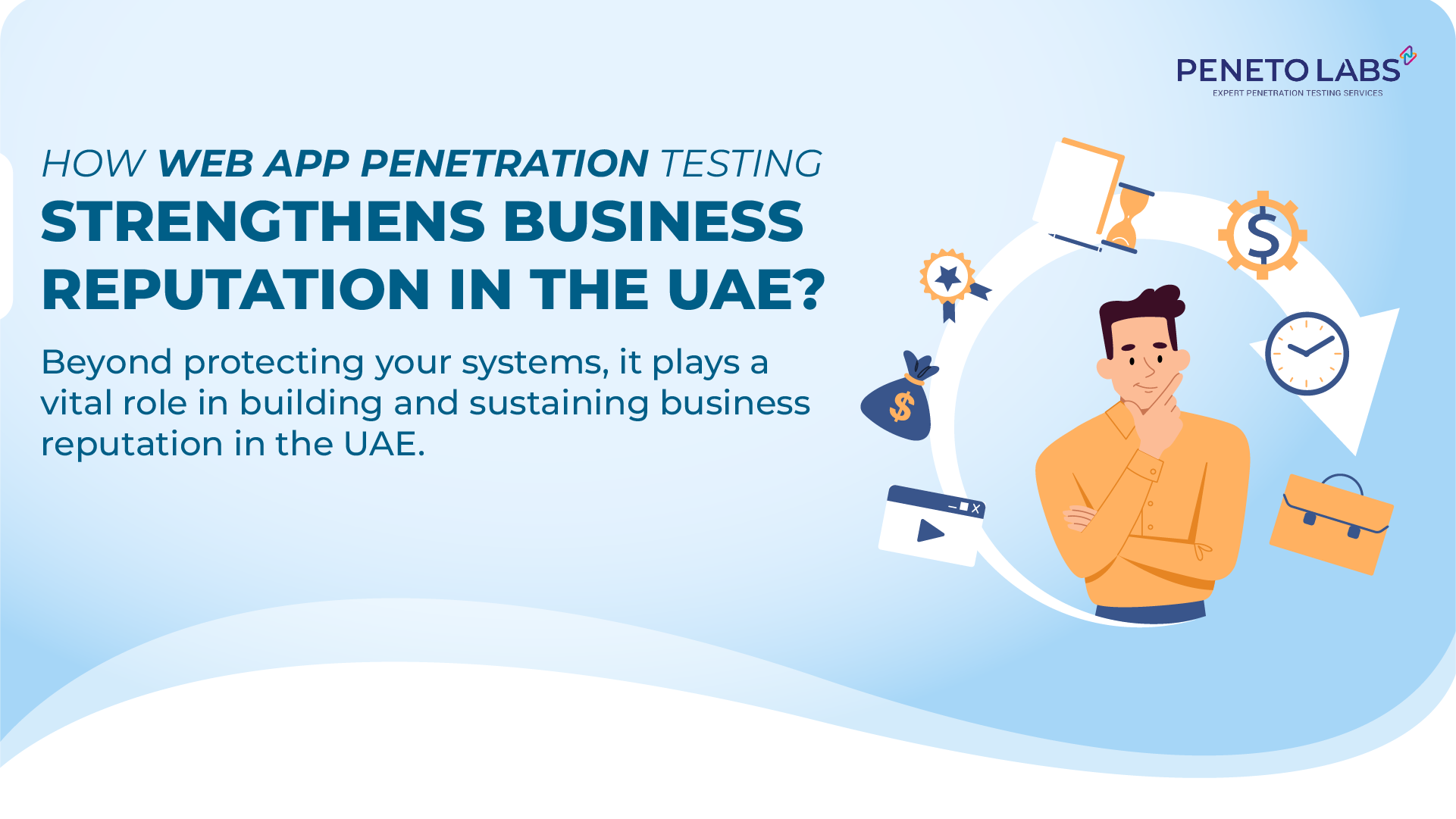A company’s reputation depends not only on its products or services, but also on its cyber resilience. Customers, partners, and regulators expect businesses to handle their data with complete security and transparency. However, as cyber threats evolve, even a small web application flaw can trigger a data breach, resulting in financial loss, downtime, and severe damage to your brand image.
That’s where Web Application Penetration Testing (WAPT) steps in. Beyond protecting your systems, it plays a vital role in building and sustaining business reputation in the UAE.
Why Reputation Matters More Than Ever in the UAE?
UAE’s business landscape is driven by trust and digital innovation. Whether you’re a fintech startup in Dubai or an e-commerce brand in Abu Dhabi, one data breach can shake customer confidence overnight. In a market where competition is fierce, security assurance becomes a brand differentiator. Businesses that actively invest in penetration testing are often seen as credible, compliant, and trustworthy.
What Is Web Application Penetration Testing?
Web Application Penetration Testing, or WAPT, is a simulated cyberattack performed by ethical hackers to identify vulnerabilities in your web applications. The goal is to find and fix security gaps before malicious attackers exploit them. It’s not just a technical necessity, it’s a reputation safeguard for modern businesses.
How Web App Pentesting Strengthens Business Reputation?
Let’s explore how regular web app pentesting helps UAE businesses maintain a strong and reliable market image.
1. Builds Customer Trust
Customers today are security-aware. They look for signs that their personal data is safe when dealing with a brand. When your web applications undergo periodic pentesting, it reflects your commitment to protecting customer information. This proactive approach earns long-term trust and loyalty, two pillars of brand reputation.
2. Demonstrates Regulatory Compliance
The UAE has introduced several cybersecurity frameworks such as:
- NESA Information Assurance Standards
- Dubai Electronic Security Center (DESC) regulations
- UAE Personal Data Protection Law (PDPL)
Many of these require periodic vulnerability assessments and security audits. By conducting certified penetration tests, you show regulators and partners that your business meets all compliance and data protection requirements, a key factor for brand credibility.
3. Prevents Costly and Public Breaches
A single data breach can destroy years of reputation-building. According to global studies, nearly 60% of small businesses close within six months after a major cyber incident. Penetration testing helps prevent this by identifying weaknesses before attackers do. By avoiding a public security incident, you protect your brand image, customer base, and market position.
4. Boosts Investor and Partner Confidence
In today’s business world, investors and corporate partners assess a company’s security maturity before collaboration. A tested and secured web application assures them that you are serious about risk management and business continuity. Regular pentesting reports serve as proof of your security commitment, making it easier to attract partnerships and investments.
5. Enhances Operational Reliability
When a web application is compromised, it can cause downtime, financial loss, and customer frustration. Pentesting helps your IT team fix weaknesses early, ensuring smoother and uninterrupted operations. Reliable systems reflect professionalism and professionalism builds brand respect.
6. Strengthens Internal Security Culture
A company known for its strong cybersecurity culture gains both customer and employee respect. Pentesting encourages teams to prioritize secure coding, data privacy, and continuous improvement. This mindset shift promotes internal accountability, which ultimately strengthens the brand’s public image.
7. Differentiates You from Competitors
In the UAE, where digital competition is rising, security can be your strongest marketing asset. When customers compare multiple service providers, they often prefer the one with visible cybersecurity practices. Showcasing your penetration testing initiatives in proposals, audits, or certifications can give you a competitive edge.
How Often Should UAE Businesses Conduct Web App Pentesting?
To maintain strong cyber hygiene and trust, UAE businesses should perform web application penetration testing at least twice a year — or after:
- Major code or system updates
- Integration of third-party tools
- Expansion to new regions or platforms
- Security incidents or policy changes
This ensures your applications remain compliant and breach-resistant throughout their lifecycle.
Partnering with the Right Cybersecurity Experts
Choosing the right pentesting partner is equally important. A certified and experienced vendor such as Peneto Cyber Risk Review LLC provides:
- Manual and automated testing based on OWASP standards
- Detailed reports with practical remediation steps
- Post-assessment support and compliance guidance
Working with trusted cybersecurity professionals ensures that testing is accurate, ethical, and aligned with UAE regulatory frameworks.
Conclusion
Web application penetration testing is more than a technical measure, it’s a business strategy. For UAE organizations, it ensures compliance, protects brand reputation, and builds the trust needed to grow sustainably.
By prioritizing regular pentesting and security audits, your business sends a strong message: “We care about your data, and we take security seriously.” In a market where trust defines success, that message is your biggest reputation booster. A secure business is a respected business. Invest in regular web application penetration testing today because your reputation is worth protecting tomorrow.
